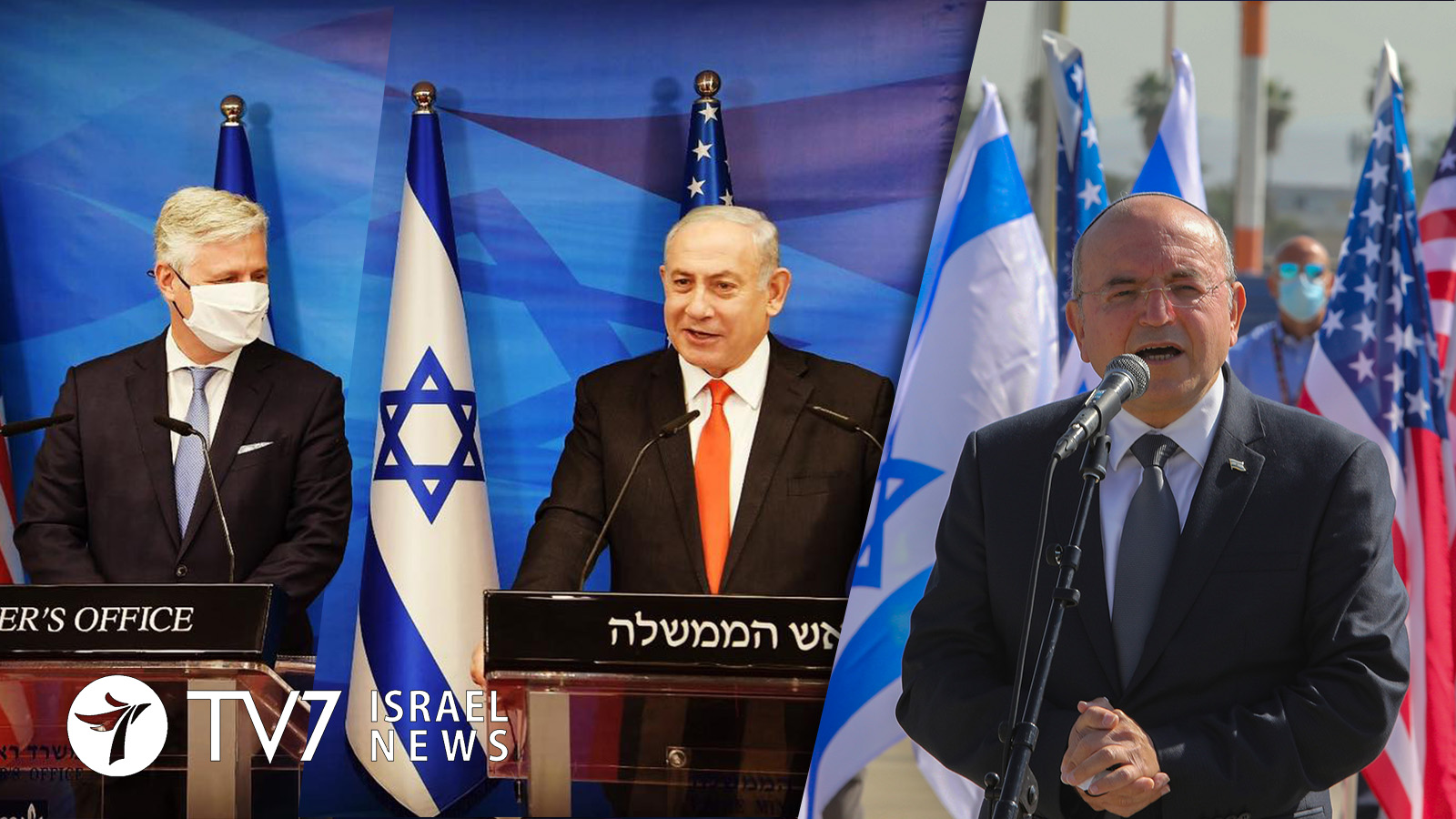Israeli Prime Minister Benjamin Netanyahu thanked visiting United States National Security Adviser Robert O’Brien in Jerusalem for unprecedented bilateral cooperation between the two countries.
During the visit, O’Brien awarded the U.S. Department of Defense (DoD) medal for Distinguished Public Service to his Israeli counterpart, Meir Ben-Shabbat. The medal is the highest honor the DoD can give to a non-US citizen.
“National Security Advisor O’Brien, Robert, it’s a pleasure to welcome you back to Jerusalem with your team. You have an excellent ambassador, our great friend David Friedman. I want to thank you personally for your personal friendship, for your friendship to the State of Israel and for your extraordinary cooperation with our National Security Advisor, Meir Ben-Shabbat. Meir is shy, but I’m not shy about speaking about the great thing he’s done with you, because working together, the two of you have helped produce incredible results for both our countries,” said Netanyahu, adding that the medal was “well deserved and very moving.”
According to a statement communicated by the Prime Minister’s Media Advisor, Netanyahu went on to say, “Under President Trump, the United States and Israel are working together closer than ever before. We cooperate together to foil common threats. We cooperate together to bring about peace. In both areas, we’ve produced amazing progress.”
After saying that “the Abraham Accords have brought about historic breakthroughs for peace with four Arab countries: the UAE, Bahrain, Sudan and now with Morocco” which have created “enormous excitement in Israel,” Netanyahu said, “None of these breakthroughs of course would have been possible without the participation and active involvement and leadership of President Trump and his able team. So once again, I say thank you President Trump.”
Israel has officially ratified its normalization deals with the United Arab Emirates and Bahrain, and reportedly close to finalizing its accord with Sudan.
O’Brien said additional Israeli-Arab normalization deals will follow the Abraham Accords, commenting, “peace deals are becoming a regular event.”
There has been widespread speculation that Oman or Indonesia may be the next Muslim nations to forge ties with the Jewish State.
As for the ongoing conflict with the Palestinians, who have rejected the Trump administration’s peace initiative across the board, Prime Minister Netanyahu voiced his belief that the White House proposal would ultimately be implemented because it was the “first truly realistic plan” to seriously address Israel’s national and security interests.
Echoing that statement, O’Brien said, “President Trump put forward the most serious and realist plan for peace, the most detailed Palestinian plan ever presented, one that proposes a realistic two-state solution while fully addressing Israel’s security concerns.”
Turning to Iran, Netanyahu said that Israeli-U.S. close national security cooperation is evident in mutual efforts “to roll back” the Islamic Republic’s “aggression” and to “stop its frantic race to the bomb.”
Rather than “coddling the tyrants in Tehran, President Trump has adopted the policy of maximum pressure,” which he maintained is “widely supported across the Middle East.”
“Both Israelis and Arabs praised President Trump when he pulled out of the failed Iran nuclear agreement, when he re-imposed and beefed-up tough sanctions on Iran, when he took out the Iranian arch terrorist, Qassem Soleimani,” declared Netanyahu, underscoring that, “When Israelis and Arabs agree on so many things, it makes sense for the world to pay attention. After all, we live in this region. We know something about it.”
Stressing “we shouldn’t go back to business as usual with Iran,” Netanyahu advocated, “We should all unite to prevent this major threat to world peace,” as long as the Islamic Republic continues to “call for Israel’s destruction,” “subjugate and threaten its neighbors,” “persist in its dangerous quest for nuclear weapons” or “bankroll, equip and train terrorist organizations throughout the region and the world.”
Denouncing Iran as a “nasty neighborhood bully” intent upon becoming a “global bully,” Netanyahu said he knew O’Brien and all U.S. allies in the region share his belief that if left “unchecked” the Islamic Republic would immediately arm itself with nuclear tipped ICBMs capable of targeting Europe and America.
For his part, the U.S. National Security Advisor said that “The momentum is now on the side of the peacemakers,” and “others will follow because the way of peace is far better than the way offered by terrorists… and radical clerics.”
